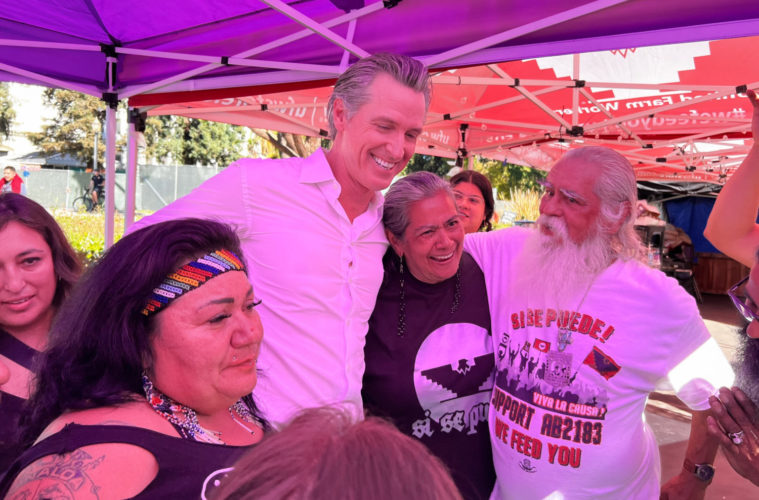After weeks of protests in front of the California Capitol, Governor Gavin Newsom signed a bill intended to “expand farmworker union rights.”
The bill was an agreement with the United Farm Workers union and the California Labor Federation, “clarifying language,” about farmworkers’ voting rights and voter integrity for a 2023 legislative session.
“California’s farmworkers are the lifeblood of our state, and they have the fundamental right to unionize and advocate for themselves in the workplace,” Governor Newsom said Wednesday. “Our state has been defined by the heroic activism of farmworkers, championed by American icons like Cesar Chavez, Dolores Huerta, and Larry Itliong. California is proud to stand with the next generation of leaders carrying on this movement.”
The Bill would expand the ways in which farmworkers may vote in union elections, including mail-in ballots and authorization cards, a process which is already commonplace for the National Labor Relations Board.
Part of the supplemental agreement involves the signing of a law intended to increase the processes that provide voter confidentiality, and over the following five years, limits the amount of “card-checks,” which at times is used to take the place of a formal election.
Employers who are found to commit “unfair” labor practices could then be fined up to $10,000 for each violation.
View this post on Instagram
Assembly Bill 2183 was passed by the California senate on August 30, days after Newsom vetoed a previous version of the bill, with the governor’s office saying it “cannot support an untested mail-in election process that lacks critical provisions to protect the integrity of the election, and is predicated on an assumption that government cannot effectively enforce laws.”
In an attempt to bring attention to the bill, supporters stood outside the capitol building, every day, waiting for Newsom to sign it into law.
Holding signs that read, “We feed you,” and “We need your signature, governor,” protesters said they would not leave the front of the capitol until Newsom responded to the bill.
The protests came after a planned 24-day, 335-mile march to the capitol, with many starting from Delano, California on August 3.
“They just wanted to have their voices heard and their voices were heard,” Flor Martinez, an immigration rights advocate said in an Instagram video. “Thanks to everyone who put pressure on and has been part of this movement.”
The buzz around the bill made its way to the top, with U.S. President Joe Biden expressing support for it and urging Newsom to sign it into law.
“I strongly support California’s Agricultural Labor Relations Voting Choice Act (AB 2183), which will give California’s agricultural workers greater opportunity to organize and collectively bargain for better wages, benefits, and working conditions,” Biden said in a September 4 statement. “Farmworkers worked tirelessly and at great personal risk to keep food on America’s tables during the pandemic. In the state with the largest population of farmworkers, the least we owe them is an easier path to make a free and fair choice to organize a union. I am grateful to California’s elected officials and union leaders for leading the way.”
Newsom had until Friday to sign AB 2183, and the protesting farmworkers had already planned a 24-hour vigil as one of its last demonstrations before the deadline.
The set-up altar for the vigil ended up being where Newsom walked down and signed the bill, with the surrounding protesters chanting, “Si se puede,” which loosely translates to, “It is possible.”
BREAKING: Gov. @GavinNewsom stops by the @UFWupdates vigil, signs AB2183 into law. The legislation will allow farmworkers to vote remotely in union elections. pic.twitter.com/UN3eBU1kWS
— Eytan Wallace (@EytanWallace) September 28, 2022
Advertising disclosure: We may receive compensation for some of the links in our stories. Thank you for supporting LA Weekly and our advertisers.

